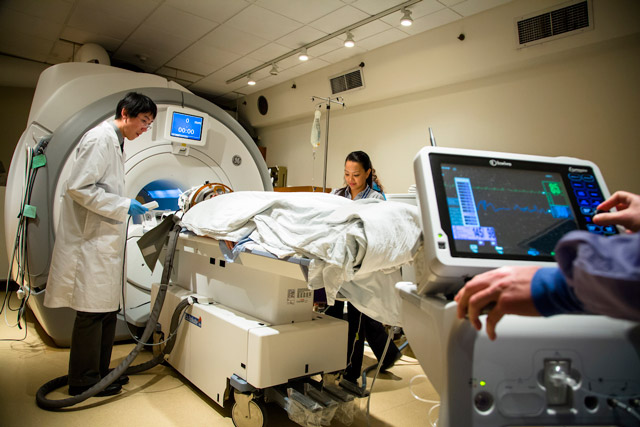MRI-guided focused ultrasound surgery centre
 This dual-site centre, which has mirror suites at Sunnybrook Research Institute (SRI) and Thunder Bay Regional Research Institute, is unique.
This dual-site centre, which has mirror suites at Sunnybrook Research Institute (SRI) and Thunder Bay Regional Research Institute, is unique.
In it, clinicians, researchers and engineers, in partnership with the world’s leading medical device companies, are working together to develop and test magnetic resonance-guided focused ultrasound technology. This technology is based on the groundbreaking work of Dr. Kullervo Hynynen, director of Physical Sciences at SRI, and a Canada Research Chair in Imaging Systems and Image-Guided Therapy.
Magnetic resonance-guided focused ultrasound surgery will revolutionize medicine. One of its most potent applications is to destroy tumours noninvasively. It can be thought of as “scalpel-free surgery,” because no incision is required to remove the tumour.
It works by pairing MR with high-intensity focused ultrasound to a target within the body, like a tumour. The ultrasound energy is applied precisely to that spot, generating heat and destroying the tumour. During the treatment, feedback from MR functions as a thermal “map.” It is used first to identify the target, for treatment planning. It is then used to guide the ultrasound as it is applied. Finally, it used to determine right away if the treatment worked.
Scientists and clinicians are evaluating MR-guided focused ultrasound to treat uterine fibroids in a clinical trial. These fibroids are noncancerous tumours that affect up to 50% of women of childbearing age. Symptoms can be severe, and result in missed family and work time. Many treatments are invasive; a main one, hysterectomy, causes infertility. The MR-guided focused ultrasound treatment is an outpatient procedure that requires no general anesthetic. Patients go home the same day, and return to their routines quickly, even the next day. The technique was evaluated in 2015 by Health Quality Ontario as an effective and cost-saving intervention. Based on its analysis, the agency recommended focused ultrasound as a noninvasive option for women with uterine fibroids who want to avoid a hysterectomy. This recommendation is under review by the Ministry of Health and Long-Term Care.
Several other trials of high-intensity focused ultrasound are underway, including treatment of Parkinson’s disease, obsessive-compulsive disorder, and head and neck, and rectal cancer. In recognition of the pioneering work of our research and clinical teams, SRI was designated a Centre of Excellence in Focused Ultrasound. It is the first in Canada and one of only eleven in the world.


